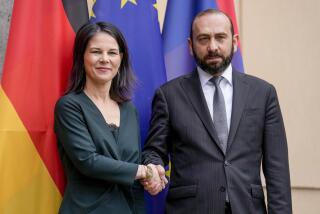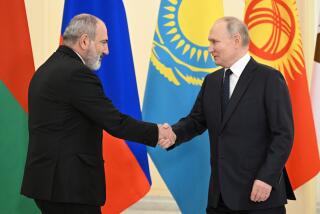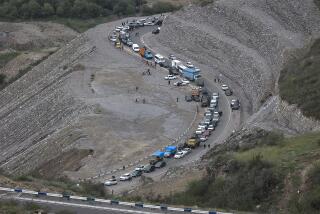From the archives: Gorbachev Challenged by New Ethnic Turmoil
MOSCOW -- The two southern Soviet republics of Armenia and Azerbaijan appear headed for a major new confrontation that will seriously test the ability of President Mikhail S. Gorbachev to find political solutions to the country’s mounting ethnic problems.
To support its claim to the disputed Nagorno-Karabakh region, Azerbaijan is tightening its two-week-old economic blockade of Armenia, halting all rail and truck traffic to the neighboring republic, which also claims Nagorno-Karabakh.
The Armenian capital of Yerevan is running short of food, according to local officials, and about half of its factories have exhausted their supplies of raw materials and stopped work.
Mountainous Region
Nagorno-Karabakh itself was described by its chief administrator as “never more tense and explosive” than it was at the end of last week. The Azerbaijani roadblocks have prevented all food, fuel and other materials from reaching the mountainous region in more than 10 days, even when troops have escorted the convoys.
The Armenian and Azerbaijani parliaments are meeting in emergency sessions this weekend to discuss the crisis, but a hoped-for compromise died almost immediately in their angry, nationalistic debates.
The Azerbaijan Supreme Soviet demanded early Saturday that the central government return administration of Nagorno-Karabakh to its control; because of the prolonged civil unrest there, the region has been run by a special administrator since January.
The radical Azerbaijan Popular Front, which organized a weeklong general strike in the republic earlier this month to demand greater political and economic autonomy, declared that no compromise is possible on the Nagorno-Karabakh issue and threatened to strike again if local Communist Party leaders took a more moderate line. Rather than face further strife, the local officials bowed to the front.
The Armenian Parliament replied later Saturday with another call for the incorporation of Nagorno-Karabakh, which is predominantly Armenian although it lies within Azerbaijan, and dozens of deputies demanded that the central government intervene immediately to break the Azerbaijani blockade.
In Nagorno-Karabakh itself, the residents of Stepanakert and the other towns were running short of food, according to the official news agency Tass. Farmers have stopped harvesting their crops because of fuel shortages and are now slaughtering livestock for which they have no high-protein feed. Even police cars and ambulances are running out of gas.
Arkady Volsky, the region’s chief administrator, warned on Friday that tensions are rising rapidly and that renewed clashes between Armenian residents and their Azerbaijani neighbors could result despite the deployment of troops there to maintain peace.
An explosion aboard an intercity bus bound for the Azerbaijani capital of Baku from Tbilisi in the neighboring republic of Georgia killed three people and injured a number of other passengers on Saturday afternoon, according to Tass. The KGB, the Soviet state security agency, is investigating, suggesting that authorities suspect that a bomb might have been the cause of the explosion.
Warning against new violence in Nagorno-Karabakh, Volsky observed that the state had a primary duty to maintain order and protect lives and would use its military power if necessary to do so. More than 120 people have been killed in the past 18 months in the conflict over Nagorno-Karabakh.
“The state cannot stand aside if blood is spilled,” Volsky said at the end of the week. “Therefore, we have to use Interior Ministry troops and other forces at our disposal. What is more important though is that both republics find ways of reconciliation. . . .
“It’s quite obvious that Nagorno-Karabakh reflects the discord between two big peoples, the Armenians and the Azerbaijanis, but it is wrong to bring their problems down to Nagorno-Karabakh.”
With the sharp challenges from Armenia and Azerbaijan as well as from other restive areas of the country, Gorbachev clearly faces more trouble in finding political solutions for the Soviet Union’s diverse ethnic problems.
A compromise resolution had been laboriously negotiated by two members of the Soviet Communist Party’s ruling Politburo as a way of easing the country’s most explosive ethnic conflict before the party’s policy-making Central Committee meets on Tuesday to discuss the nation’s deepening crisis, but it never came to a vote in Azerbaijan as deputies took a far more militant position.
Gorbachev, attempting to cool the rising nationalist passions around the country, warned in comments published Saturday against moves threatening to split up the Soviet Union. Hinting at major new political reforms, the Soviet leader also promised far greater autonomy to the country’s constituent republics as well as greater protection for its ethnic minorities.
All of the country’s 15 republics are tied together economically, culturally and through human contacts, Gorbachev said, defending the political union that grew out of the old Russian empire and the incorporation of additional territory in the past 70 years.
“If we now allowed the situation to deteriorate to the point where these ties would start to break up, the republics and the whole country would be set back by decades,” he told leaders of the restive Baltic republics of Estonia, Latvia and Lithuania.
But Gorbachev also stressed the party’s determination to accelerate the decentralization of power, strengthening the republics, as well as its resolve to protect minority rights. “Any attempt to infringe on citizens’ rights on an ethnic basis should be regarded as contradicting the principles of Soviet statehood and humanism,” he said, according to an account of his remarks in the party newspaper Pravda.
Unprecedented Severity
Azerbaijan’s economic blockade of Armenia, unprecedented in its severity and dramatic in its political implications, may force the central government to intervene before the crucial Central Committee meeting in Moscow this week.
With officials in Baku professing their inability to reopen the railroad and highways into Armenia, Gorbachev may have little choice but to deploy more troops in the region. At stake is not only the well-being of one of the Soviet Union’s smallest republics but also the authority of the central government and the party and the future of the country’s federal system. Yet, Gorbachev emphasized in his discussion with Baltic leaders the need for political solutions to such problems.
Eduard Mirzoyan, a member of both the Armenian and national parliaments, told the Armenian legislature Saturday that the republic’s vital rail link with the rest of the country had been closed for 12 days and that central authorities had done nothing to reopen it.
Government spokesmen in Yerevan said that Armenia, which gets 87% of its cargo through Azerbaijan, is running short of food and many daily necessities that come from other parts of the Soviet Union. In some areas, there is only bread in state stores, and in others what food is available cannot be distributed because of fuel shortages.
The reconstruction of Leninakan, Spitak and other towns heavily damaged in the devastating earthquake last December has all but stopped, with workers subsisting on a diet of bread supplemented by some local fruits and vegetables.
“This is economic war being waged by Azerbaijan against Armenia,” an Armenian journalist in Yerevan said. “Millions of tons of food and other goods are piling up in Azerbaijan, including foreign relief supplies for the victims of the earthquake, but nothing, absolutely nothing is moving.”
The national youth newspaper Komsomolskaya Pravda said last week, “You can count the cars on the main streets in the Armenian capital on the fingers of one hand. Public transport is running with long intervals. Ambulances stand idle. Zvartnots Airport may have to close down.”
Rail traffic, which had been severely restricted for several weeks, came to a halt during the Azerbaijan Popular Front’s general strike earlier this month, and it did not resume when the strike ended. Azerbaijani authorities say they cannot guarantee safety of trains to Armenia because of vigilantes’ armed attacks on them. Relief convoys from other parts of the Soviet Union have been unable to break through the Azerbaijani roadblocks, according to Soviet press accounts.
More to Read
Start your day right
Sign up for Essential California for news, features and recommendations from the L.A. Times and beyond in your inbox six days a week.
You may occasionally receive promotional content from the Los Angeles Times.






